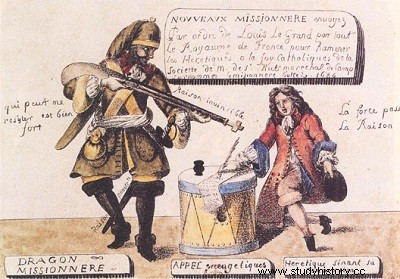
Edict signed by Louis XIV suppressing all the advantages granted to Protestants by Henri IV.
Louis XIV, considering that the reformed religions jeopardize the unity of France and that the Huguenots practice too zealous proselytism, revokes, on October 17, 1685, the edict of 1598.
This decision is the culmination of a series of coercive measures taken against Protestants since 1661. Addressing the great king, Bossuet exclaimed in one of his sermons:. By you, heresy is no more! »
The revocation of the Edict of Nantes is accompanied by the following provisions:
abolition of temples and denominational schools;
prohibition of sermons, public or private;
banishment of pastors refusing to submit;
baptism and Catholic education made compulsory for the children of Huguenots.
Religionists residing abroad must, within four months, return to the kingdom, failing to do so their properties will remain confiscated. Those remaining on national soil cannot cross the borders, under pain of hardship for men, and imprisonment and seizure of property for women.
Nearly 200,000 reformed French people will expatriate following the revocation of the Edict of Nantes.
